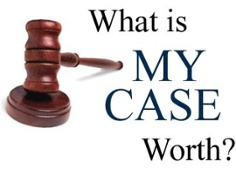Accidents happen. Often, they happen when we least expect them. Regardless of the nature of the accident, they can cause financial hardship along with severe physical and emotional distress. When another party was the cause of your injuries, you can likely recover damages to cover your expenses from that party. The Pennsylvania Supreme Court said “[a]s a general proposition victims indeed must be compensated for all that they lose and all that they suffer.” The idea is that the plaintiff should be “made whole”, or put in at least as good a position as they were before the accident. The general rule for recovery is that the plaintiff must prove “a causal connection” between the defendant’s negligent conduct and the plaintiff’s injury.
Two types of recoverable damages include compensatory and punitive damages:
Compensatory Damages
These reimburse the plaintiff for harms caused by the defendant. They attempt to place a plaintiff “in a position substantially equivalent” to one the plaintiff would have been if no injury occurred in the first place. Compensatory damages are awarded for the following:
- Medical Expenses: Plaintiff may recover the cost of past and future medical expenses as a result of the accident. This includes any expenses incurred from rehabilitative care. Plaintiff must prove any medical expenses incurred were necessary and the services received were fair and reasonable. Plaintiff should keep copies of all medical bills so it is easy to quantify the total amount of expenses incurred.
- Incidental Expenses: Plaintiff may recover any incidental expenses, other than medical, stemming from defendant’s conduct. This may include any household help hired following an accident, alterations to living quarters following a debilitating injury to make them livable, and transportation and lodging costs if specialized treatment is required out of state.
- Loss of Earnings: Plaintiff may recover compensation for lost income as a result of the accident. Plaintiff may also recover future income lost as a result of inability to work due to injury from the accident.
- Loss of Earning Capacity: Plaintiff may recover for the loss of earning capacity if evidence shows defendant’s act or omission which caused injury to the plaintiff impaired his or her ability to earn, taking into account the potential opportunities to receive income that could have been pursued if not for defendant’s misconduct.
- Physical Pain and Suffering: Plaintiff may recover damages for past and future physical pain and suffering, although it is difficult to measure. It is designed to compensate the injured plaintiff for the physical distress caused by the incident immediately following, and often in the period of time following the incident in which the plaintiff continues to suffer.
- Disfigurement: Plaintiff may recover damages for a permanent disfigurement resulting from the accident, although not limited to disfigurements visible to the ordinary observer. This includes amputations, scars, limps, speech defects, etc. The availability of corrective surgery does not automatically bar recovery for this type of damage.
- Emotional Distress: Plaintiff may recover damages for the severe mental distress caused as a result of the accident, including embarrassment and humiliation. This could result from a plaintiff’s feeling others “will regard [them] with aversion or dislike” due to a physical injury, imprisonment, defamatory statement, marriage disruption, etc. Some states require the distress to be so severe it actually manifests physical symptoms in order to recover damages for emotional distress. In Pennsylvania, however, this is not always necessary.
- Loss of Life’s Pleasures: Plaintiff may recover damages stemming from an inability to enjoy day-to-day activities the plaintiff enjoyed before the injury and the ability to engage in activities in the future. These can include hobbies and exercise, the ability to marry and have children, loss of the enjoyment of food, and loss of a sense of overall well-being.
- Loss of Consortium: A plaintiff’s spouse may be able to bring a claim for loss of consortium resulting from their spouse’s injury. These claims are designed to compensate for a loss of services, companionship, protection, and guidance from the spouse, as well as the loss of ability to maintain a sexual relationship.
- Property Damage: Plaintiff may recover costs to repair or replace any property damaged as a result of the accident. This must be claimed as part of the same suit as the personal injury, otherwise recovery of these expenses is barred.
Punitive Damages
Punitive damages are also recoverable in Pennsylvania, although they are not awarded in all personal injury cases. A plaintiff may be awarded punitive damages only when a jury determines a defendant’s behavior was outrageous to the extent of showing a reckless disregard for the rights of others. The purpose of these damages is to punish the defendant for their conduct and to discourage them and others from similar reckless and outrageous behavior in the future.
Limits on Recoverable Damages
- Pennsylvania does not place a monetary cap on compensatory damages.
- Pennsylvania caps punitive damages to two times the amount of actual damages awarded.
- Pennsylvania is a modified comparative negligence state. This means that an injured plaintiff may recover damages from a defendant up until the point the plaintiff was 50% responsible for the accident causing the harm to the plaintiff. But, where a plaintiff is more than 50% responsible for the accident causing the harm, the plaintiff is barred from recovery in Pennsylvania.
If you or a loved one has suffered injuries due to the negligence of another you should contact the experienced attorneys at Stampone Law – We are here to answer all of your questions and will work to help you receive the compensation you deserve.
